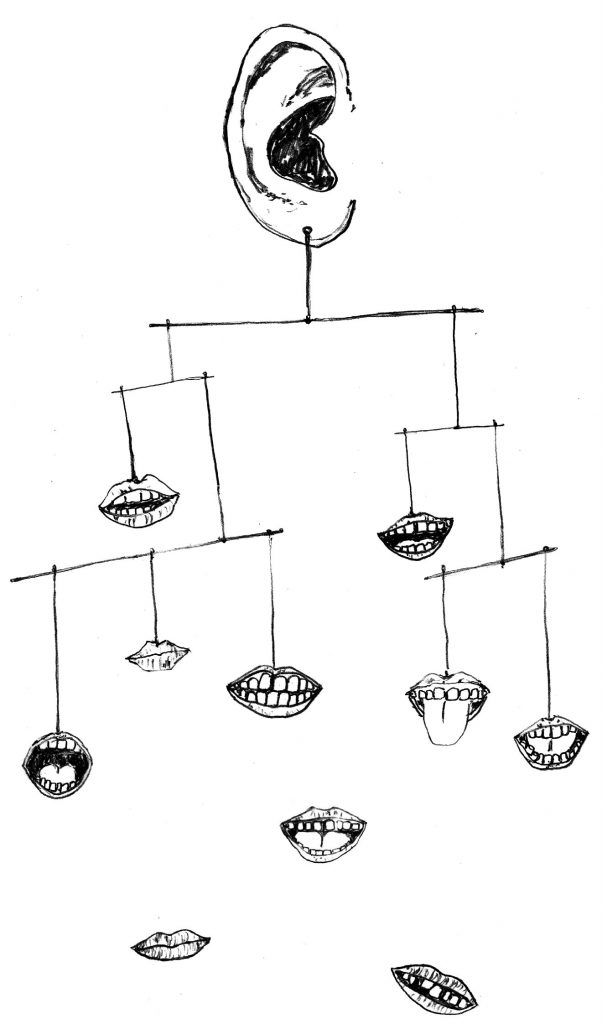A confontration with the essay from Gayatri Chakratorty Spivaks „Can the Subaltern speak?“
The text in an imposition. But basically the questions seems important: Who is talking? Who is not heard? And Why (not)? In this magazines editorial says ,,Here, critical and self-determined texts are to be found by people […] who have enough of a privileged and marginalized society and want to raise their voices …“ When we speak out against exclusion and at the same time open a room for people who want to raise their voices – it is important to question this and to consider: Who is talking? Who is not heard? And why (not)?
What voice is loud in the essay, which is used here for discussion?
Gayatri Chakravorty Spivak was born in Kolkata, India. She studied literary sciences and later in America pursued a career at university. Her work was concerned with dealing with Western philosophy, as well as marginalized people. „Can the subaltern speak?“ Was published 1988 and is considered a basic text of the postcolonial theory. In this, scientists are dealing with the consequences of imperialism. The question is: what in uences have colonies left to date in the actions and experiences of people and societies? In Fiasco, we are facing various facets of the migration regime. The awareness of possible colonial imprints is important because migration often crosses borders of imperialist structures of power.
What is written?
Various reviews, interpretations, and critiques understand Spivak‘s text differently and set their own priorities. They represent and reduce. Here is my attempt to break down Spivak‘s text to a few statements: We can not always understand the experience of others. We are living in different circumstances and communicate differently. Within a global power structure, oppressed people are not heard when they are deprived of preconceived notions of how something feels and how to communicate. When people talk about them in general statements about the oppressed or as individuals speak for many, they are not beeing freed from their position in the society.
What does Subaltern means?
The term subaltern was first used by Antonio Gramsci. The Marxist has spent his last years in jail – where he has introduced „subaltern“ into his vocabulary. Now comes a first definition: „Subalterns are those who do not belong to a hegemonic class.“ In order to understand subalternity, we must also understand the concept of hegemony. Hegemony means the domination of countries, institutions or other actors over the political, religious, cultural or economic actions of others. Where these others have no or only limited possibilities to carry out their interests and ideas. Others represent them. Others speak for them.
Can the subaltern speak?
Subalterns can speak but they are neither heard nor understood. Speaking does not refer exclusively to verbal utterances. Their practices of resistance are not perceived or misunderstood. This way, they are excluded from political and social discourse. The hegemony realizes its unity institutionally and / or in the state – the subalterns are a fragmented grouping that lacks self-consciousness as a class. Their political practices are not given any importance because they are expressed at a local level, spontaneously, sporadically, inconsistently and unorganized.
What is there to do?
Gramsci imagined the subaltern as a potentially revolutionary force and tried to overcome their fragmentation through organization. This criticizes Spivak. Subalternity is not an identity, but the designation of a position within society – the opposite of hegemony. If a heterogeneous group is organized within this position, one merely strengthens the position. The situation of people does not change, because one does not encounter them but their position in society. Essentialists assume that there is something that is common to all of the same kind. Essentialism is a philosophical position. Spivak accuses „the western left“ of applying the latter to the subaltern. Because they confuse position and identity. Once again, it is not a solidarity, a culturally uniform group but people with different interests.
So we turn to the individual person?

Do we understand person as an unbound, self-determined individual – or do we assume that the methods of work and the political structures in uence the desires and interests of a person? Marx thought of person in the second version. He made an example: „By the lack of collective consciousness of the French small farmers, they choose a political representative who is not really interested in them and their representation.“ The real interest of the person and the subsequent desire for concrete action in the world does not correspond. According to Spivak, Foucault and Deleuze (the „Western Left“) de ne the subject as a self-determined, self-contained unity in accordance with interest and desire for action. But this sovereign subject is an assumption that can not be assumed. The attempt to give voice to individual subalternates in order to free them from their position fails to recognize that the functioning human in the structure of the international division of labor does not have to know the connections and mechanisms of exploitation. That is why he may argue against his own interests. Speaking does not have to be an expression of sovereign subjectivity. Without mediation, according to Spivak‘s subaltern can not be understood.
Why should it be mediation when Spivak enters a world in which people can speak and be heard for themselves? Are we in a paradox?
Spivak does not try to give a voice to subalternes, but criticizes others who have made this attempt. It says that these have maintained the structure of hegemony and subalternity through their approach. It wants to break the structures rst, in order to be more differentiated and thus open to a social reorganization.
Is this only part of an inter-university discourse?
I ask myself that all the time. Spivak writes about post-colonial societies – the long-term implications of imperialism. India was already characterized by a class and box system in the pre-colonial era. In addition to the patriarchy and the order of the colonies, colonization led to a further ruling power, which intensi ed the disregard of the subaltern. They were either represented by the colonizing or by the national hegemony. Similar to the assumption that, starting with the establishment of women‘s voting rights, the discussion of gender issues would be irrelevant, it would be the opinion that with the national independence of colonized states, the legacy of imperialism had dissolved. The attitude, the prejudices, the images, the assumptions about normality, the limits of one‘s own horizon – they are still there and concerning all of us.
To understand how it feels to bite into a lemon, we must bite into a lemon. But can we understand how it feels for a lemon to be bitten?
Someone can not speak because he can not speak-or have nothing to say-or understand-or be shy-or afraid of something. Yes, we can imagine different reasons for this and we know some of them ourselves. That could be described as individual. We also know of structural, institutionalized exclusion mechanisms such as national boundaries or performance requirements with exclusion criteria, which make social participation impossible for all. Spivak does not discuss the problem only that subjective experiences can not always be shared, or exclusively political and economic power structures. By showing the complex situation of subalterns, especially those of the subaltern women, she tries to reject this position and the hegemonic understanding of the language, which contribute to the one-sided speechlessness.
So what does Spivak do?
Irritation – different focus. If only micropolitics, focused on local resistance informations, macro political lines of con ict, caused by globalized capitalism and national-state alliances would have been ignored. Spivak proposes to describe more precisely what different living realities of humans constitute. The questi-on would be: What does it mean to be a person in certain circumstances? This counteracts the representation of an undifferentiated group, a product of colonization. Spivak incorporates heterogeneous liberation struggles into their scienti c analysis. These are, for example, subsistence, disorganized, propertyless workers, indigenous illiterates and illiterates who live in the metropolises on the streets or just on the land or in the peripheries, as well as the women‘s movement, the peasant uprisings or the struggles of the indigenous people.
And what does this brings us now?
Spivak is to be understood as a scientist in science discourse and I do not want to scare anyone to read their text to understand other aspects and to use their examples to understand what they mean. There are enough applications of thought in our everyday life in Basel. In Switzerland, there is the practice of credibility in asylum seekers. This requires that people have to talk about their reasons to come to Switzerland – so that it meets the criteria set. This presupposes that people have a corresponding awareness about their own position and political connections. To criticize this practice, Spivak‘s criticism of the sovereign subject can provide arguments. We can ask ourselves questions: Do we meet positions or people? Do we want to take mediating roles? What role does the Fiasco play in this regard? Are we a singled unheard voice? Are we understood? Do we want or do we need mediation? And how do we deal with communication that we do not understand? Are we talking about others or directly with those concerned?
